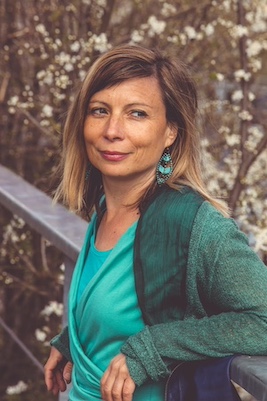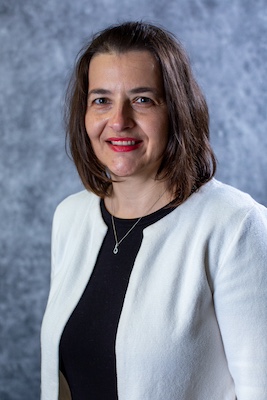Translation and introduction by Martha Kosir
Alja Adam (1976) is a poet, literary critic, and Gestalt psychotherapist. She graduated from the University of Ljubljana with a degree in Comparative Literature and Sociology of Culture. She earned her doctorate in 2007 in Gender Studies and Feminist Literary Theory, likewise from the University of Ljubljana.
Alja Adam is the author of four poetry collections: Zaobljenost (Roundedness, 2003), Zakaj bi omenjala Ahila (Why Mention Achilles, 2009), Dolgo smo čakali na dež (We’ve Long Waited on the Rain, 2015) and Privlačnosti (Attractions, 2020).
Her poems have been translated into fifteen languages and have appeared in diverse publications and anthologies in Slovenia and abroad. She is considered one of the most prominent authors of her generation. Her collection, We’ve Long Waited on the Rain, was nominated for the Veronika Award in 2016, and so was her latest collection Attractions. Attractions was also nominated for the Jenko Award, one of the most prestigious literary awards in Slovenia. The collection Why Mention Achilles was published in Spain in 2012. It was also published in Italy in 2009, and in Croatia in 2014.
Alja Adam regularly participates in literary festivals at home and abroad. In addition to poetry, she writes essays, fairytales, and scholarly articles. She also focuses on research and development of innovative educational programs for children and adults, where she blends creative writing practices with Gestalt therapy and yoga.
***
I first contacted Alja Adam in 2018, as I was preparing another article on Slavic poetry in translation for the ATA’s publication SlavFile. I was the SlavFile’s poetry feature editor from 2011 to 2023 and introduced a number of Slovenian poets over the years. I was fascinated by Adam’s poetry and excited to begin our collaboration.
After this initial work, the poet invited me to translate a selection of her poetry and prose excerpts for the project The Tree of Life, which featured a collaboration between the poet Adam and the Finnish artist Ulla Aatinen. Their collaboration culminated in an exhibition of Adam’s poetry and prose excerpts (both in the original Slovenian and the translation into English) in conjunction with Aatinen’s art. The exhibition took place in Ljubljana, Slovenia in late fall 2018.
Over the years, Alja Adam and I have collaborated on a number of other projects and presented her poetry at diverse literary events in Slovenia and abroad. We are currently awaiting the publication of an e-book of her poetry in my English translation. I have enjoyed working with the poet and look forward to new projects in the future.
***
All the poems presented below, except for “Haunted House”, come from her latest collection Attractions (2020). “Haunted House” was published in the collection We’ve Long Waited on the Rain (2015).
Adam’s poetry is characterized by a beautifully natural and unpretentious style yet filled with rich and deeply complex metaphors. Each of her poems embodies a unique experience that leaves a deep impact on the reader.
The critics have especially praised Adam’s ability to blend past with present, when examining her own experiences and those of her ancestors. She repeatedly acknowledges the profound impact of the past on the present and is particularly concerned with traumas transmitted from one generation to another. This is where her interest in Gestalt psychotherapy becomes especially evident.
Through the intricacies of human relationships, past traumas, and insecurities, Adam explores the essence of the self and its complex relationship with the world. Her poetry endeavors to “make the invisible visible”, “defy a system that pushes us into darkness” and “fill the cracks in the walls with her voice”.
Translating Adam’s poetry has been an enjoyable and inspiring experience. Translators are first and foremost readers. Thus, I am confident that the readers of this article will embark on their own journey as they explore Adam’s poetry below.
HIŠA STRAHOV
Dobro je imeti korenine,
dokler jih lahko nosiš s seboj.
(Gertrude Stein)
Nervozno pogledujem skozi okno.
Rumena jutranja svetloba nenadoma izgine,
kot da so ptice zdrsnile
prek nevidnega stikala na nebu
in ugasnile luč.
Kako nevidno narediti vidno,
se upreti sistemu, ki nas potiska v temo?
Pravijo, da smo izgubljena generacija.
Ker vsak dan nekdo ostane brez dela,
se selimo v tuja mesta, da bi preživeli,
in poskušamo ohraniti svobodo,
tako da nosimo svoje korenine s seboj.
A korenine pogosto zamenjujemo
z debli, listjem in vejami,
zato smo telo iztrgali iz zemlje,
postalo je breztežno kot molekule zraka,
kot kemijske enačbe,
ki smo se jih v šoli učili na pamet.
Ker nas niso peljali v gozd
in nam niso pokazali,
kako položiti dlan vetru na hrbet,
kako uloviti zvoke narave,
se prižeti k lubju dreves.
Pravijo, da moramo
vso razsežnost svojega bivanja
posrkati v možgane, v dolge verige tkiv,
nabrekle celice zgodovinskega spomina,
v katerih se razmnožuje strah.
Mislim, torej sem?
Ali raje dopustim koži, da odpre pore?
Da pod veke zdrsnejo zadovoljni obrazi otrok,
ki se v kleti brunarice sredi travnika
igrajo hišo strahov, in se naselim v dotik dlani,
v pregib prepletenih prstov,
ko me deklica prime za roko
in pelje po stopnicah navzdol,
kjer zakričim
in s svojim glasom zapolnim reže v steni.
HAUNTED HOUSE
What good are roots if you can't
take them with you?”
(Gertrude Stein)
I look nervously through the window.
The yellow morning light suddenly disappears,
as if the birds had slithered
over an invisible switch on the sky
and turned off the light.
How to make the invisible visible,
defy a system that pushes us into darkness?
They say we are a lost generation.
For every day someone loses work,
we move to foreign cities to survive,
and we try to preserve our freedom
by carrying our roots with us.
But we often replace those roots
with trunks, leaves, and branches;
we had ripped our bodies from the ground,
they became weightless like air molecules,
like chemical equations,
that we learned by heart at school.
They did not take us to the woods,
and they did not show us
how to pat the wind on its back,
catch the sounds of nature
and press against the bark of the trees.
They say our brain has to
import the entire dimension of
our existence into long strands of tissue,
into swollen cells of historical memory,
inside which fear breeds.
I think, therefore, am I?
Should I let my skin open its pores instead?
Make children’s happy faces slide under the eyelids,
children, who play haunted house in the basement
of a log cabin in the middle of a field.
Should I settle into the touch of a palm, into the fold of
intertwined fingers, when a girl grabs my hand
and takes me down the stairs,
where I cry out
and fill the cracks in the walls with my voice.
(From the collection: We’ve Long Waited on the Rain, 2015)
DVOJNICA
Včeraj je zmanjkalo elektrike,
robovi stolov in mize so skoraj izginili,
in druga jaz, moja dvojnica,
ki po finski legendi prebiva v svetu spodaj,
se mi je naselila v telo kot noč.
Osvobojena merjenja
svojih korakov, časa do večerje,
sem tipala po prikolici
in predmeti so uhajali
iz rok kot curki.
Kasneje, ko so napeljavo popravili,
in so se ljudje porazgubili v sanjah,
sem začutila bolečino od pasu navzdol:
rasel mi je ribji rep,
a nikakor se nisem uspela
pognati v spanec.
DOUBLE
Yesterday, there was a power outage,
the edges of the table and chairs almost disappeared,
and that other me, my double,
who, according to the Finnish legend, resides in the netherworld,
settled into my body like the night.
Free from measuring
my steps and time until dinner,
I felt around the camper
and the objects escaped through
my fingers like running water.
Later, when the power was restored,
and the people got lost in their dreams,
I began to feel pain from the waist down:
I was growing a fish tail,
yet I failed to plunge
myself into slumber.
(From the collection: Attractions, 2020)
STARKA
Rešuje svet.
Sklonjena pod kupom knjig,
še vedno verjame, da je mogoče znanje
premešati kot karte,
izvleči eno samo, dolgo izgubljeno.
V otroštvu jo je njen pijani stric,
po kvartopirski noči pretepel
in jo poskušal vreči skozi okno.
Kadar govoriva o zablodah sveta,
me nestrpna preglasi,
kot, da me potiska proti oknu.
Zagrizla je v lastno meso
in ne zmore razkleniti čeljusti, nasilja.
Kar je izgubila v otroštvu,
je trepetalo kot kovanec:
vrtel se je po tleh,
dokler se ni v mraku sobe ustavil.
OLD LADY
She is saving the world.
Stooped under a pile of books,
she continues to believe that knowledge
can be reshuffled like a deck of cards,
by pulling out a card long-lost.
In her childhood, her drunk uncle
beat her and tried to throw
her out of the window after a long night of gambling.
When we speak about the fallacies
of the world, she impatiently shouts me down
as if trying to push me toward the window.
She bites into her own flesh
and is unable to unclench her jaw, the violence.
What she had lost in her childhood,
twirled like a coin:
it spun on the floor
until it stopped in the twilight of the room.
(From the collection: Attractions, 2020)
OBIČAJNE STVARI
Stvari se uničijo, obrabijo,
zarjavijo, popokajo,
izgubijo obliko.
Midva vsak na svojem koncu sveta
loviva izgubljeno,
na zmajanem stolu pijeva vino iz odkrušenega kozarca,
zreva v nebo:
na robovih je natrgano kot pisemska ovojnica.
Nekega dne preneha boleti,
kjer zeva praznina,
se vrtinčijo snežinke, sredi poletja.
Ni tako neobičajno
zapisati željo z roko,
jo odposlati v pričakovanju jutra,
ponovno nazdravljati z nekom, segati v besedo,
se v nerodnosti, naglici, med vsakodnevnimi opravili, spotakniti:
šele, ko pohodim tvoje prste,
vem, kje stojiš.
Ta misel me pomirja kot snežinke,
dva zmajana stola na balkonu sredi poletja.
ORDINARY THINGS
Things get destroyed, worn out,
rusty, cracked,
they lose their shape.
Each at our own end of the world,
we pursue what has been lost,
on a wobbly chair, we drink wine from a chipped glass,
we stare at the sky:
its edges are frayed like an envelope.
One day it stops hurting,
in the middle of summer,
snowflakes swirl in gaping emptiness.
It is not so unusual
to write down a wish by hand,
send it in anticipation of the morning,
toast with someone again, interrupt a conversation,
stumble in awkwardness and haste while performing daily tasks:
only when I step on your toes,
I know where you stand.
This thought calms me down like snowflakes,
two wobbly chairs on a balcony in the middle of summer.
(From the collection: Attractions, 2020)
 |  |
| Alja Adams | Martha Kosir |
